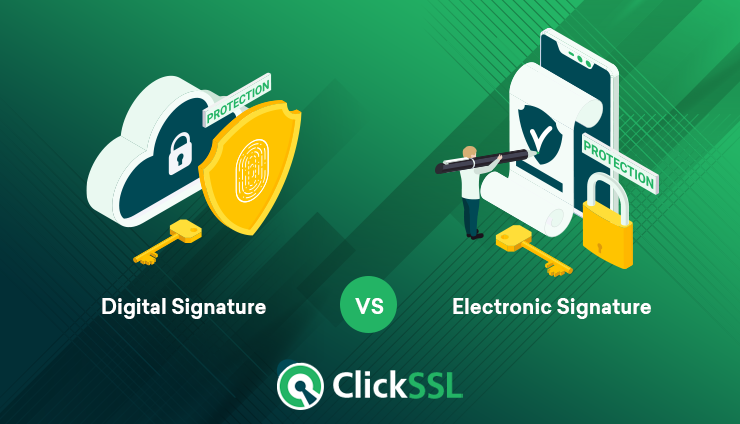Digital Signature vs Electronic Signature – The main difference is, Digital signatures secure documents while Electronic signatures verify the document.
Ever since businesses became digital, everything revolving around them has started transforming itself. The enhanced use of digital securities like SSL certificates and the use of signatures (either done digitally or electronically) for securing and verifying documents are proof of the rise in digitalization.
Many business owners mistake these terms, i.e., digital signatures and electronic signatures to be similar, and feel that they share the same meaning, but in reality, these terms are relatively different and have different features as well as are used for varied reasons.
Ever wondered how signatures can be confusing? Are you aware that the technology and processes required for your business depend on which signature is appropriate for your business?
So, without further ado, let’s discuss digital signatures vs electronic signatures, their benefits, their differences, and the ideal sign to be implemented for your digital empire.
What is a Digital Signature?
The digital signature is a kind of electronic signature, having one major difference. A digital certificate is needed for signing the documents digitally. Generally, when signatures are involved, many individuals as well as companies, have some concerns like:
- The signer’s authenticity and the authenticity of the signature.
- The authenticity of the document and assurance about its originality
In paper-based signs, notaries would assure the originality of the document and the authenticity of the signature. Digital signatures are just like notarized signatures, wherein digital certificates are used. These certificates are issued from a genuine Certificate Authority (CA) after complete verification of owner identity.
When a document is digitally signed, the cryptographic algorithms bind your site data and digital certificate into a distinctive fingerprint that can’t be modified or duplicated.
With the help of encryption, these signatures prove to be a secured tool for authenticating and securing documents.
Key features of a Digital Signature:
- A digital signature is distinguished by a distinct feature in a digital document that is placed on the document.
- Digital signatures portray the authenticity of the signer and the document.
- It also assures that the signer’s identity has been verified by a trustworthy CA before the issuance of the digital certificate.
- Digital signatures ensure data integrity. Tampering documents having digital signatures is not possible.
- The signer cannot disown his digital signature and hence repudiation is not possible.
- DocuSign, Adobe Sign, and MS Word are the document signing platforms that support digital signatures.
How do Digital Signatures Work?
Just like handwritten signatures, digital signatures carry their uniqueness. Following the PKI (Public Key Infrastructure) they use cryptographic algorithms to generate a key pair that is mathematically linked to each other. They are termed as the private key and the public key.
With the help of a digital certificate, the signer uses the private key for placing a digital signature on a document. The algorithm generates a cryptographic hash (encrypted) for the document using the private key. This digital signature is kept in a secured place.
When such signed documents are sent to the intended recipient, the signer’s public key is also appended with the document. The encrypted message is decrypted with this public key. Failure in the decryption process is a warning sign stating that the signature is modified or invalid.
Read the difference between Digital Signature vs Digital Certificate.
What is an Electronic Signature?
An electronic signature (e-signature) is a legit way to gain acceptance on electronic forms/electronic documents. It is a perfect replacement for any handwritten signature since it carries a similar legal weightage to it, provided it adheres to the rules and regulations made for it.
When an electronic sign is placed on the document, it states that the document is verified. It has varied forms like an image of a handwritten signature or typing your initials/name in the signature box via tablet/app.
Intention, verification, and a commitment to sign are the motto of an electronic signature.
Key Features of Electronic Signature:
- An electronic signature involves the use of an electronic symbol or a process that is attached to a document with the purpose of signing.
- An electronic signature can be vocal, a click, or a sign.
- It is done with the signer’s intent to approve the document content.
- When a signer signs electronically, it authenticates and verifies the document.
- Execution of a contract or any other agreement is possible.
- They are efficient and budget-friendly.
How do Electronic Signatures work?
The electronic signatures are done with the help of the private key. The signer uses this private key for signing the document. The mathematical algorithms modify the signature into a cipher (hash). This is encrypted for security reasons.
Are Electronic Signatures Legally Binding?
Yes, ever since ESIGN (Electronic Signatures in Global and National Commerce Act) – 2000 was passed, electronic signatures are legally binding and carry the same legal weightage as compared to normal signatures done on paper. Each state which follows the federal law knows that electronic signatures are approved by the legislation and hence are legally binding.
States which are deprived of federal law, use UETA (Uniform Electronic Transactions Act) to ensure that these signatures have the same legal bindings as paper-based signatures.
Differences Between Digital Signature Vs Electronic Signature
The below-mentioned differences of e signature vs digital signature will enlighten business owners to make a perfect choice for their business. Let’s check out the variables between electronic signature vs digital signature to know which one surpasses the other.
| Digital Signature | Electronic Signature |
| The document is secured with a digital signature. | The document is verified with an electronic signature. |
| Authorization of digital signatures is done by a Certificate Authority and hence it’s trustworthy. | No authorization is done in case of electronic signature and hence their authenticity is doubtful. |
| It provides strong security since it has more features as compared to the latter. | It consists of lesser security features and in many cases can’t prevent tampering from intruders. |
| Verification of digital signature to confirm the originality of the document is possible. | Verification of the signer is not possible in this case since the same is not certified. Hence the authenticity and integrity of the document are doubtful. |
| Since it provides more authenticity when signed, and can trace the owner of the document, it’s more preferred amongst business owners. | Since the authenticity levels are low as compared to digital signatures, and the owner can’t be traced, it’s less preferred amongst business owners. |
| The main motto of a digital signature is to secure the document. | The main motto of an electronic signature is to sign the document. |
| Tampering is not possible in the case of a digitally signed document. | Tampering can occur in the case of an electronically signed document. |
| There are 2 types of digital signatures, i.e., Microsoft and Adobe pdf. | There are 4 types of electronic signatures, i.e., basic electronic signature, advanced electronic signature, click-to-sign electronic signature, and qualified signature. |
| Audit logs and modifications in the same are easily traceable in the case of digital signatures. | Audit logs are a tough call in the case of electronic signatures. |
| More security and non-tampering of data make them more reliable. | Less security and unable to prevent tampering, make them less reliable. |
| Digital signatures use PKI, which is an advanced key mechanism to secure the document. | In the case of electronic signatures, the key mechanism is basic and hence data security is less. |
| Properly defined, certificate-based digital ID authentication methods make this signature more popular. | Undefined authentication methods make this signature-less popular. They use the signer’s email id, PIN, or mobile number for authentication. |
| Digital signatures use cryptographic algorithms. | Electronic signatures lack the use of cryptographic algorithms. |
| A “fingerprint” of this sign is appended in the signed document with the help of a digital certificate. | An electronic signature looks like a handwritten signature and it can be in the form of a password or a PIN. |
| Since signer identity is verified and established, repudiation is prevented. | Since signer identity can’t be established, repudiation is possible. |
| Digital signatures are legally binding and prove to be legally valid. | Electronic signatures are also legally binding, but they depend on the court. They may differ on a case-to-case basis. |
Final Words:
Digital vs electronic signatures have their benefits and differences. Choosing the ideal one for your business requires a lot of brainstorming. Though the type of signature depends on the document which needs to be signed, businesses in the current scenario have documents/contracts comprising of sensitive data and hence it’s preferred to opt for digital signatures.
Document integrity and authenticity as well as owner identity verification are all the positives that compel business owners to use digital signatures for ensuring document privacy.



